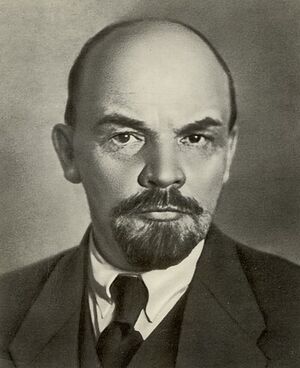Difference between revisions of "Vladimir Lenin"
m (Text replacement - "He served as " to "He was ") |
(quote: "We would be deceiving both ...) |
||
| Line 1: | Line 1: | ||
{{person | {{person | ||
| − | |constitutes=Revolutionary, | + | |constitutes=Revolutionary, Politician, Lawyer |
|wikipedia=https://en.wikipedia.org/wiki/Vladimir_Lenin | |wikipedia=https://en.wikipedia.org/wiki/Vladimir_Lenin | ||
|amazon=https://www.amazon.co.uk/V.-I.-Lenin/e/B000APFMSK/ | |amazon=https://www.amazon.co.uk/V.-I.-Lenin/e/B000APFMSK/ | ||
| + | |image=Vladimir Lenin.jpg | ||
|spouses=Nadezhda Krupskaya | |spouses=Nadezhda Krupskaya | ||
|alma_mater=Leningrad State University | |alma_mater=Leningrad State University | ||
| Line 37: | Line 38: | ||
}} | }} | ||
}} | }} | ||
| − | '''Vladimir Ilyich Ulyanov''' | + | '''Vladimir Ilyich Ulyanov''', known as '''Vladimir Ilyich Lenin''', was a Russian communist [[revolutionary]], [[politician]] and political theorist. He was the leader of the [[Russian]] SFSR from [[1917]] after which he started a massive campaign of executions of the political and non-political opposition resulting in 100.000 to 200.000 deaths, solidifying his power as Premier of the [[Soviet Union]] from [[1922]], until his death. |
| + | {{SMWQ | ||
| + | |text=We would be deceiving both ourselves and the people if we concealed from the masses the necessity of a desperate, bloody war of extermination, as the immediate task of the coming revolutionary action. | ||
| + | |subjects= | ||
| + | |authors=Vladimir Lenin | ||
| + | |date=1906 | ||
| + | |source_details=Vladimir Lenin, “Lessons of the Moscow Uprising,” Proletary, No. 2, August 29, 1906. | ||
| + | |source_URL=https://en.wikiquote.org/w/index.php?title=Genocide&oldid=3281421 | ||
| + | }} | ||
==Official narrative== | ==Official narrative== | ||
| Line 45: | Line 54: | ||
==Policies== | ==Policies== | ||
===Labor Camps=== | ===Labor Camps=== | ||
| − | [[Vladimir Lenin]] brought back forced labor of [[political]] prisoners in labor camps from [[1918]]<ref>http://www.bucknell.edu/x17601.xml</ref><ref>https://www.history.com/topics/russia/gulag</ref>, the "Main Directorate of Camps" internationally now known as GULAG became a system extensively utilized by the [[Soviet Union]]. | + | [[Vladimir Lenin]] brought back forced labor of [[political]] prisoners in labor camps from [[1918]]<ref>http://www.bucknell.edu/x17601.xml</ref><ref>https://www.history.com/topics/russia/gulag</ref>, the "Main Directorate of Camps" internationally now known as [[GULAG]] became a system extensively utilized by the [[Soviet Union]]. |
===Red Terror=== | ===Red Terror=== | ||
| − | The Red Terror in Soviet Russia was justified in Soviet historiography - and by virtually all allies of Lenin such as [[Leon Trotsky]] as a wartime campaign against counter-revolutionaries during the Russian Civil War of 1918–1921, targeting those who sided with the Whites (White Army). Bolsheviks referred to any anti-Bolshevik factions as Whites, regardless of whether those factions actually supported the White movement cause. | + | The [[Red Terror]] in Soviet Russia was justified in Soviet historiography - and by virtually all allies of Lenin such as [[Leon Trotsky]] as a wartime campaign against counter-revolutionaries during the Russian Civil War of 1918–1921, targeting those who sided with the Whites (White Army). Bolsheviks referred to any anti-Bolshevik factions as Whites, regardless of whether those factions actually supported the White movement cause. |
| + | |||
The Red Terror campaign is considered to have officially begun between 17–30 August 1918 as retribution for two assassination attempts (one of which was successful). | The Red Terror campaign is considered to have officially begun between 17–30 August 1918 as retribution for two assassination attempts (one of which was successful). | ||
| Line 56: | Line 66: | ||
{{SMWDocs}} | {{SMWDocs}} | ||
| − | |||
==References== | ==References== | ||
{{reflist}} | {{reflist}} | ||
Revision as of 21:11, 8 May 2023
Vladimir Ilyich Ulyanov, known as Vladimir Ilyich Lenin, was a Russian communist revolutionary, politician and political theorist. He was the leader of the Russian SFSR from 1917 after which he started a massive campaign of executions of the political and non-political opposition resulting in 100.000 to 200.000 deaths, solidifying his power as Premier of the Soviet Union from 1922, until his death.
“We would be deceiving both ourselves and the people if we concealed from the masses the necessity of a desperate, bloody war of extermination, as the immediate task of the coming revolutionary action.”
Vladimir Lenin (1906) [1]
Official narrative
Like most non-elected heads of state of the 1900s, Lenin remains a controversial figure, mostly outside Russia, for his dozens of alleged humans rights abuses. Lenin died in 1924 and also because of the later work of his successor - Joseph Stalin - Lenin escapes modern scrutiny.
Policies
Labor Camps
Vladimir Lenin brought back forced labor of political prisoners in labor camps from 1918[2][3], the "Main Directorate of Camps" internationally now known as GULAG became a system extensively utilized by the Soviet Union.
Red Terror
The Red Terror in Soviet Russia was justified in Soviet historiography - and by virtually all allies of Lenin such as Leon Trotsky as a wartime campaign against counter-revolutionaries during the Russian Civil War of 1918–1921, targeting those who sided with the Whites (White Army). Bolsheviks referred to any anti-Bolshevik factions as Whites, regardless of whether those factions actually supported the White movement cause.
The Red Terror campaign is considered to have officially begun between 17–30 August 1918 as retribution for two assassination attempts (one of which was successful).
Among the victims of the Red Terror were tsarists, liberals, non-Bolshevik socialists, members of the clergy, kulaks ('affluent' peasants), Mensheviks, foreigners, suspected counter-revolutionaries, and other political dissidents. Later, industrial workers who failed to meet production quotas were also targeted.
Estimates for the total number of victims of Bolshevik repression, however, vary widely. One source asserts that the total number of victims of repression and pacification campaigns could be 1.3 million, while others go as low as 20000.[4]
References
- ↑ https://en.wikiquote.org/w/index.php?title=Genocide&oldid=3281421 Vladimir Lenin, “Lessons of the Moscow Uprising,” Proletary, No. 2, August 29, 1906.
- ↑ http://www.bucknell.edu/x17601.xml
- ↑ https://www.history.com/topics/russia/gulag
- ↑ https://en.wikipedia.org/wiki/Special:BookSources/978-3593507057
